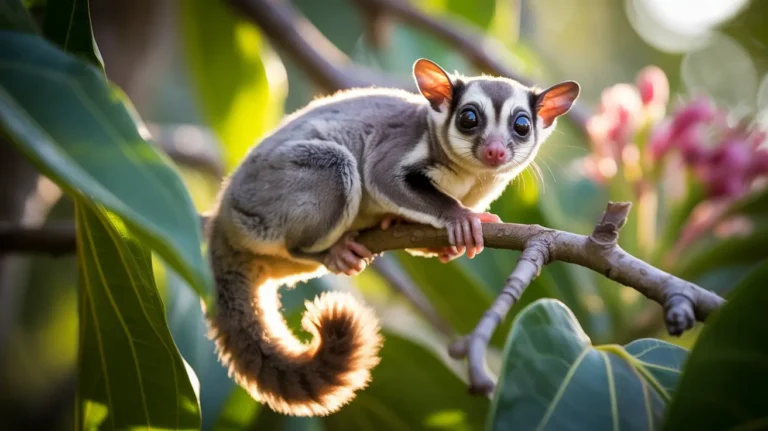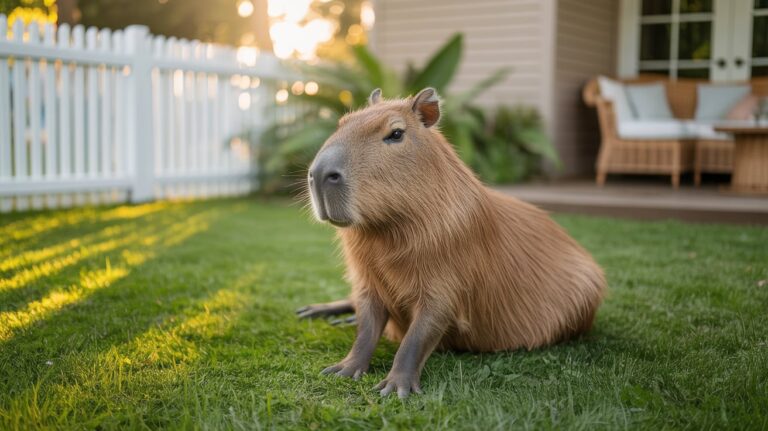Capybaras As Pet ? Pros, Cons, and Legal Insights
Are you dreaming of a pet that’s not just cute but also incredibly unique? Enter the capybara, often dubbed the world’s largest rodent. These gentle giants are known for their friendly demeanor and quirky personalities, making them an intriguing choice for pet enthusiasts. But before you rush out to adopt one of these furry companions, it’s essential to consider what life with a capybara entails. From their social nature to specialized care needs, owning a capybara is a big commitment that comes with its own set of rewards and challenges. Let’s dive into everything you need to know about keeping these exotic creatures as pets!
What is a Capybara?
Capybaras are the largest rodents in the world, native to South America. They can weigh up to 150 pounds and measure around four feet long. Their sturdy bodies and short legs make them appear quite unique.
These creatures thrive near water, often found in rivers, lakes, and wetlands. They have webbed feet that help them swim gracefully. Capybaras are social animals and typically live in groups of ten or more.
With their gentle demeanor, they tend to get along well with other pets too. Their soft fur is brownish-gray, which helps camouflage them in their natural habitat.
Capybaras communicate through a range of sounds like barks, whistles, and purrs; each sound conveys different emotions or alerts for danger. This fascinating blend of characteristics makes them one-of-a-kind companions for those who choose to welcome them into their homes.
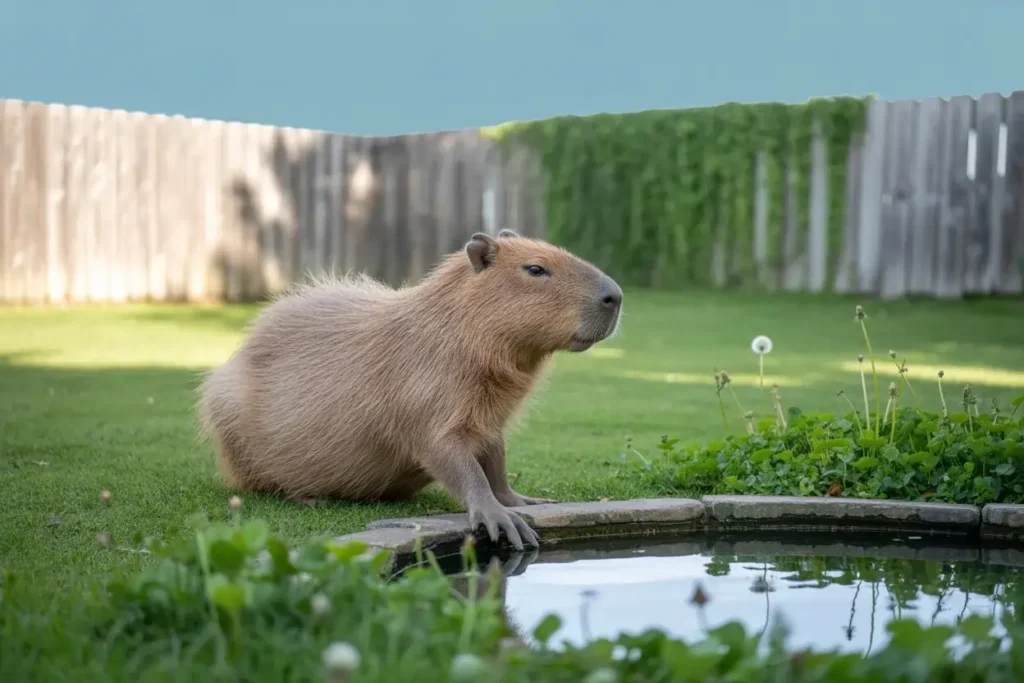
Pros of Owning a Capybara
Capybaras are incredibly social creatures. They thrive in groups, often forming strong bonds with their owners and other animals. Their friendly demeanor makes them excellent companions for families and individuals alike.
Caring for a capybara isn’t as demanding as one might think. While they require attention, they are relatively low maintenance compared to many traditional pets. A little time spent each day can keep them happy and healthy.
Owning a capybara also means having a unique pet that stands out from the crowd. Their exotic nature often draws curiosity from friends and neighbors, making them great conversation starters.
Training these gentle giants is possible with patience and consistency. From basic commands to fun tricks, capybaras can learn behaviors that enhance your bond while keeping their minds engaged.
Social Animals
Capybaras are renowned for their social nature. These creatures thrive in groups and form strong bonds with one another. It’s not uncommon to see them cuddling or grooming each other, showcasing their affectionate side.
When kept as pets, they often seek companionship from humans as well. A single capybara may become lonely without interaction. They require regular mental stimulation and engagement to stay happy and healthy.
Their friendly demeanor makes them great playmates. Capybaras enjoy water activities and can easily adapt to playful interactions with their owners. However, it’s essential to remember that these animals need a lot of social time, so potential pet owners must be prepared for the commitment.
Having more than one capybara is often recommended if you want a contented pet experience. This way, they can engage in natural behaviors together while also enjoying your company.
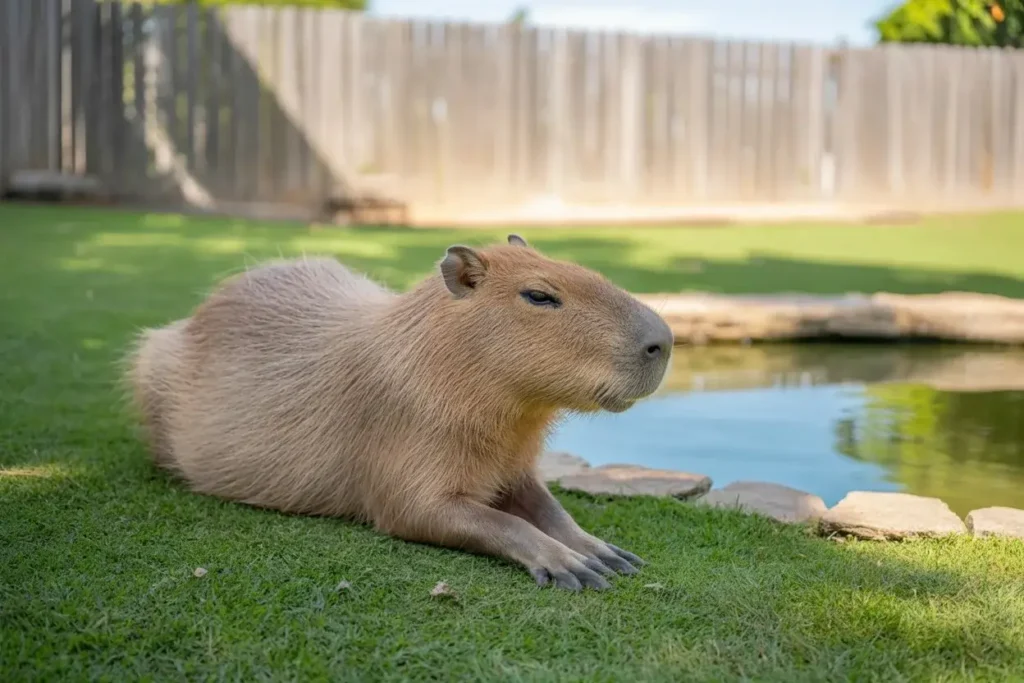
Low Maintenance
One of the appealing aspects of owning a capybara is their low maintenance nature. Unlike many traditional pets, these gentle giants don’t require extensive grooming or complicated routines.
Capybaras are relatively clean animals. They enjoy bathing and swimming but don’t demand daily baths like some other pets might. A simple water source to splash around in suffices for their hygiene.
Feeding them can also be straightforward. Their diet mainly consists of grasses and hay, which makes shopping easier compared to more specialized pet foods.
Additionally, they tend to bond well with humans and other pets without needing constant attention or training sessions. This allows owners to enjoy companionship without feeling overwhelmed by care requirements.
If you’re someone who appreciates a relaxed approach to pet ownership, the capybara could fit seamlessly into your lifestyle while adding a touch of whimsy and joy.
Unique and Exotic Pet
Capybaras stand out as one of the most unique pets you can consider. Their gentle nature and sociable demeanor make them an intriguing choice for those looking to step outside the conventional pet realm.
These semi-aquatic mammals are often referred to as “nature’s sofa” due to their calm disposition, encouraging a relaxed atmosphere wherever they roam. Unlike typical pets like cats or dogs, capybaras offer a distinct experience that sparks fascination among friends and family.
Owning such an exotic animal provides not just companionship but also opens doors to learning about wildlife conservation and habitat preservation. This fascinating species encourages pet owners to embrace their quirks while providing endless moments of enjoyment through their playful antics.
With proper care, capybaras become more than just pets—they transform into cherished family members with personalities that shine brightly in any home setting.
Can be Trained
Capybaras are surprisingly intelligent creatures. With patience and positive reinforcement, you can teach them various commands. They respond well to simple cues like “come” or “sit.”
Training sessions should be short and engaging. Just a few minutes each day can yield impressive results. Capybaras enjoy social interaction, making training an excellent bonding experience.
They have the ability to learn tricks too! Some owners report their capybaras mastering playful skills such as jumping through hoops or even fetching items.
Consistency is key in keeping your training effective. Using treats as rewards will motivate them significantly. Establishing routines helps build trust between you and your pet.
Remember that every capybara has its own personality. While some may take longer to train, others might pick up new skills quickly, adding an exciting dynamic to your life together.
Cons of Owning a Capybara
Owning a capybara comes with several challenges that potential pet owners should consider. First, the initial cost can be quite high. Prices for these exotic pets vary significantly and often include additional expenses like habitat setup.
Space is another critical factor. Capybaras thrive in large areas where they can roam freely and socialize. A small apartment or home won’t suffice; you need ample outdoor space to ensure their well-being.
Their dietary requirements are also specialized. These animals require a diet rich in hay, fresh vegetables, and specially formulated pellets, which may not be readily available at your local store.
Additionally, health concerns could arise due to their unique physiology. Regular veterinary care from professionals experienced with exotic animals is essential but might prove difficult to find in some areas.
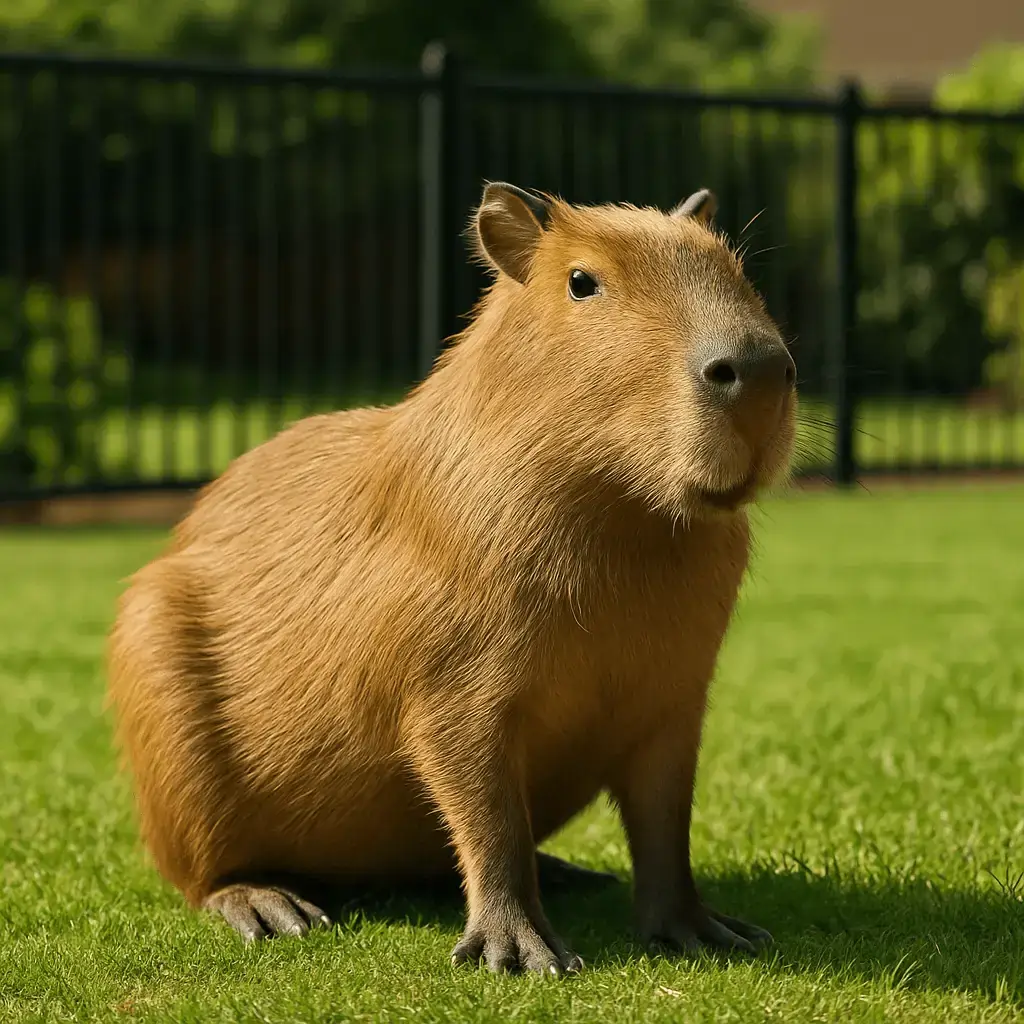
High Initial Cost
Owning a capybara comes with a hefty price tag. The initial cost can be quite shocking for new pet owners. Prices often range from $1,000 to $3,000 or even more depending on the breeder’s reputation and location.
Beyond purchasing the animal itself, there are additional expenses to consider. Specialized housing is essential for ensuring their comfort and safety. This could mean building a spacious enclosure that mimics their natural habitat.
You’ll also need to factor in veterinary care. Regular check-ups with an exotic pet veterinarian aren’t cheap and may include vaccinations specific to rodents.
Finally, don’t overlook the costs associated with food and supplies tailored specifically for capybaras. These factors contribute significantly to your upfront investment in these unique pets. So it’s vital to prepare financially before bringing one home.
Requires Large Space
Capybaras are not your typical house pets. They thrive in spacious environments, ideally requiring a large outdoor area to roam freely.
These social creatures enjoy interaction with their surroundings and need plenty of room to explore. A cramped setting can lead to stress and behavioral issues.
A minimum of one-quarter acre is often recommended for a pair of capybaras. That’s quite a lot compared to other small pets! Creating an environment that mimics their natural habitat enhances their overall well-being.
If you’re considering adding a capybara to your family, be prepared for the space demands. Living indoors or in tiny spaces isn’t suitable for these gentle giants, as they require ample room for exercise and playtime.
Having enough space also allows them adequate shelter from the elements, which is crucial for their health and happiness.
Specialized Diet and Care Needs
Capybaras have specific dietary requirements that set them apart from more common pets. They are herbivores, primarily grazing on grasses and aquatic plants in the wild. This means their diet must be rich in fiber to maintain proper digestion.
Providing a balanced diet includes hay, fresh vegetables, and specially formulated pellets designed for rodents or exotic animals. It’s essential to avoid sugary fruits and starchy foods as these can upset their sensitive digestive systems.
In addition to their food needs, capybaras require access to clean water at all times. They often enjoy soaking in shallow pools or baths; this is not just for fun but also vital for keeping their skin healthy.
Regular veterinary check-ups are crucial too. Capybaras may face health issues like dental problems if not cared for properly. Keeping an eye on their weight and dental condition will ensure they thrive in a home environment.
Potential Health Concerns
Potential health concerns are an important aspect to consider when thinking about capybara ownership. These social creatures can be prone to specific ailments, many of which stem from their unique dietary and environmental needs.
Dental problems are common among capybaras due to their continuously growing teeth. Regular monitoring and appropriate chew toys are essential for maintaining oral health.
Additionally, capybaras have sensitive skin that can lead to issues like fungal infections or dermatitis if not properly cared for. Ensuring a clean living environment is crucial in preventing these conditions.
Moreover, they can also suffer from gastrointestinal problems if their diet isn’t carefully managed. Providing fresh greens, hay, and avoiding harmful foods is vital for digestive wellness.
Lastly, stress-related illnesses may arise in capybaras kept alone or without proper socialization. Understanding these potential health risks will better prepare you for the responsibilities of pet ownership.
Legal Requirements for Owning a Capybara as a Pet
Owning a capybara can be an exciting adventure, but it’s crucial to understand the legal landscape before diving in. Laws about pet ownership vary widely by state and municipality. Some places allow them without restrictions, while others classify them as exotic animals requiring permits.
Before bringing home a capybara, check local regulations. This may involve contacting your city or county animal control office for specific guidelines. Certain regions might also have zoning laws that dictate where you can keep such pets.
In addition to local laws, consider potential federal regulations as well. The U.S. Fish and Wildlife Service oversees some wildlife species which could affect your ability to own a capybara legally.
If you’re serious about adding one of these fascinating creatures to your family, thorough research is essential for compliance with all applicable laws and ensuring you’re ready for responsible pet ownership.
How to Care for Your Pet Capybara
Caring for a pet capybara requires attention to their unique needs. First, create a spacious enclosure that mimics their natural habitat. A fenced outdoor area with access to water is ideal since they love swimming.
Next, focus on diet and nutrition. Capybaras are herbivores and thrive on grasses, hay, and fresh vegetables. Avoid processed foods as they can lead to health issues.
Grooming is essential too; regular brushing helps keep their coat healthy and free from mats. Pay attention to their nails as well—trimming them may be necessary to prevent discomfort.
Behaviorally, capybaras are social creatures that enjoy companionship. They thrive in pairs or small groups, so consider adopting more than one if possible. Regular interaction will help reduce stress and promote a happier life for your furry friend.
Diet and Nutrition Tips
Capybaras have a unique dietary requirement that sets them apart from typical household pets. Their diet primarily consists of high-fiber foods, which are essential for their digestive health. Fresh grasses and hay should make up the bulk of their meals.
In addition to grass, leafy greens can be offered as a daily treat. Items like romaine lettuce, cilantro, and dandelion greens add variety while providing vital nutrients.
Common Behavioral Characteristics
Capybaras are known for their friendly and social nature. They thrive in groups, often forming strong bonds with other capybaras and even different animal species. This sociability makes them surprisingly affectionate pets.
These creatures tend to be quite curious. They love exploring their environment, which can lead to playful interactions with humans. It’s not unusual for a capybara to follow its owner around the yard or investigate new objects.
On the flip side, they can also exhibit shy behavior when introduced to unfamiliar situations or people. Patience is key here; allowing them time to adjust will help build trust.
Capybaras communicate through various sounds like barks, whistles, and clicks, each indicating different emotions or needs. This unique vocalization adds depth to their personality and creates an engaging dynamic between pet and owner.
FAQs About Capybaras as Pets
Q1: Are capybaras legal everywhere?
No, capybaras are illegal in some states like California and Georgia. Always check local laws first.
Q2: Can capybaras live indoors?
Capybaras need outdoor space with water access. Keeping them indoors is not healthy for them.
Q3: How long do capybaras live as pets?
With good care, capybaras can live 8–12 years in captivity.
Q4: Do capybaras get along with other pets?
Yes! Capybaras are social and can bond with dogs, cats, and even birds, but introductions should be slow and supervised.

